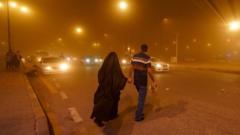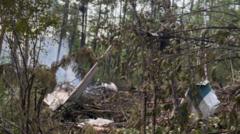An unprecedented sandstorm in Iraq has left over 1,000 individuals with serious respiratory problems, prompting concerns over environmental conditions deteriorating due to climate change. Health officials report numerous hospitalizations and restricted visibility, raising alarms about the increasing rate of dust storms in the region.
Iraq Faces Respiratory Crisis Amid Record Sandstorm Events

Iraq Faces Respiratory Crisis Amid Record Sandstorm Events
More than 1,000 residents affected by severe sandstorm respiratory issues as climate change heightens frequency.
A severe sandstorm has wreaked havoc across central and southern Iraq, leading to over 1,000 reported cases of respiratory distress among residents, according to health officials. A spokesperson from Muthanna province stated that approximately 700 incidents of suffocation were documented, while eyewitness video footage depicted cities engulfed in a thick orange haze. The storm has prompted widespread power outages and flight cancellations throughout various regions.
Dust storms have long plagued Iraq; however, climate change has caused experts to warn about their rising frequency. The country's environment ministry has cautioned that citizens should brace for an increase in "dust days." To mitigate health risks, pedestrians and police have donned face masks, while paramedics have been dispatched to help those struggling to breathe.
Reports indicate that hospitals received at least 700 suffocation cases in Muthanna province, while more than 250 individuals were treated in Najaf province, with 322 patients—many of whom are children—admitted to hospitals in Diwaniyah. In addition, 530 people experienced breathing issues in the provinces of Dhi Qar and Basra, where the sandstorm significantly reduced visibility to less than one kilometer (0.62 mile).
Authorities have shut down airports in Najaf and Basra due to the conditions, although weather services predict a gradual improvement by Tuesday morning. The UN has identified Iraq as one of the top five countries most susceptible to climate change, which also faces challenges related to extreme temperatures and scarce water resources. This follows a severe sandstorm in 2022 that resulted in a fatality and left more than 5,000 in need of medical attention for respiratory ailments. According to government officials, the nation's residents should prepare for an alarming increase in dust-related health issues in the foreseeable future.




















